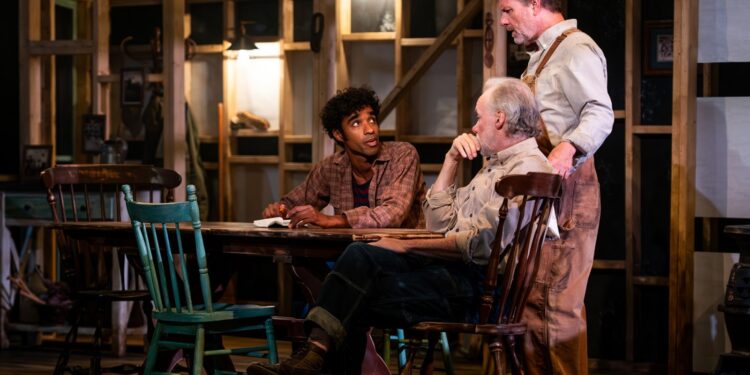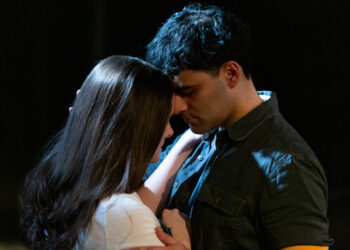A poignant play about memory and storytelling. Tom Barnett, Stephen Jackman-Torkoff, and Patrick McManus deliver nuanced performances showcasing tremendous character depth and grit. Alan Dilworth masterfully directs with care and sensitivity. This ‘Drawer Boy’ becomes a play of genuine human emotional connection.
The year is 1972, and the rural setting is Clinton, located in southwestern Ontario. Miles (Stephen Jackman-Torkoff), an actor from a Toronto theatre group, visits the home of two senior bachelor farmers, Morgan (Patrick McManus) and Angus (Tom Barnett). Miles and the other actors are conducting research on farm life with the hope of writing a new play that accurately portrays the life of a farmer. This process is reminiscent of documentary theatre. Each actor, including Miles, stays on different farms, completes their assigned tasks, and then reports back to rehearsals with the information and insights they have gathered, ultimately leading to the performance. Morgan agrees to let Miles stay on his farm, leading to humorous situations that arise from this trusting and unsuspecting arrangement.
Morgan and Angus have lived together quietly for years, always supporting each other but isolated from the outside world. Their past lives become a crucial focus of the play. While Morgan is gruff and stubborn, Angus is gentle but struggles with memory loss due to a World War II injury. He often forgets recent events, such as baking bread or remembering Miles’s presence, and frequently asks about the identity of the actor. Angus is initially referred to as a “drawer boy,” a nod to his past as a designer of buildings, similar to the role of an architect. The term ‘drawer boy’ takes on a complex understanding as the play unfolds.
When Miles invites Morgan and Angus to a rehearsal of the play the actors are working on, this event sparks a cataclysmic change in charting how art becomes life. Memory and story, as well as the use of theatre to depict the reality of life, forever haunt these three men.
Nick Blais’s set design for Angus and Morgan’s farmhouse is truly impressive. He has meticulously defined the kitchen area, along with the front and back entrances, as well as the yard in front of the house. André du Toit’s lighting effectively highlights the performance space, enhancing key elements and building tension throughout the production. Richard Feren’s selection of music from the 70s era piqued my ears, as it did with others sitting around me. The lone guitar strumming sound in some of the set changes is haunting. Feren also includes a terrific soundscape of barnyard animals that can be quietly heard off in the distance, but never overpower the action onstage.
Alan Dilworth’s sensitive and careful direction of playwright Michael Healey’s humane script is one of the production’s highlights. In his Director’s note in the programme, Dilworth writes how “the power of story and its ability to call forth the human capacity for complexity, dignity, kindness and transformation” still inexorably draws him into Healey’s masterpiece.
Tom Barnett, Stephen Jackman-Torkoff, and Patrick McManus effectively evoke the very human qualities of complexity, dignity, kindness, and transformation. The Thousand Islands’ Drawer Boy features three protagonists who each discover that there are no easy answers to their challenges. Jackman-Torkoff’s Miles is comically funny when he realizes his ineptitude in operating certain farm equipment. Additionally, Stephen’s pretentious attempt to imitate what he thinks is a cow mooing is quite amusing. However, Jackman-Torkoff also reveals that there is more to Miles’ character. His secretive behaviour—listening to conversations between Angus and Miles and then using that information through appropriation to advance the play in which he performs—creates a painful conflict for Morgan, who struggles to forgive him.
Patrick McManus’s Morgan is rough, unrefined and coarse. He can barely tolerate Jackman-Torkoff’s Miles and takes pleasure in acknowledging the young actor’s incompetence, notably at the top of the second act, which had many around me in fits of laughter. Yet McManus’s Morgan care, love and respect for Angus remain of prime importance. Morgan doesn’t want to speak about what happened with Angus at all. When the truth finally emerges, McManus’s Morgan has clearly transformed, recognizing that what should have been done was not done.
Tom Barnett delivers a heartbreaking performance as Angus, particularly in moments when he needs to be calmed down through repetitive tasks, such as making a sandwich or counting the stars in the sky. While it is plain speech Morgan uses to calm Angus down, this plain, simple speech becomes almost poetic in nature. When Angus asks Morgan to tell ‘the story’, there’s a sense within the language of something that registers even higher in Angus’s mind. It is during the rehearsal of Miles’s play that Angus is reawakened to what actually occurred in his and Morgan’s past. The moment is heartbreaking in Angus’s memory, and Barnett beautifully achieves the emotional arc.
Make sure you read important information in the programme about playwright Healey’s inspiration for The Drawer Boy. It drew inspiration from Toronto’s Theatre Passe Muraille’s 1972 production of a collective experimental theatre creation, ‘The Farm Show.’ The Farm Show, according to the programme show notes: “sought to tear down the walls of convention, the strict, traditional ideas of what theatre SHOULD BE and to dare to create SOMETHING NEW.”
This ‘Drawer Boy‘ is good theatre. The script, 25 years old, still resonates with audiences in the twenty-first century because it dares to challenge conventional thinking in a new way. The production is also indicative of the high quality of productions this year at the Thousand Islands Playhouse.
Please go and see it.
Running time: approximately two hours with one interval/intermission.
The production runs to September 28 at the Firehall Theatre, Thousand Islands Playhouse, 185 South Street, Gananoque. For tickets: 1000islandsplayhouse.com or call (613) 382-7020.
THOUSAND ISLANDS PLAYHOUSE presents
The Drawer Boy by Michael Healey
Directed by Alan Dilworth
Set and Costume Designer: Nick Blais
Lighting Designer: André du Toit
Sound Designer: Rebecca Eamon Campbell
Performers: Tom Barnett, Stephen Jackman-Torkoff, Patrick McManus
















